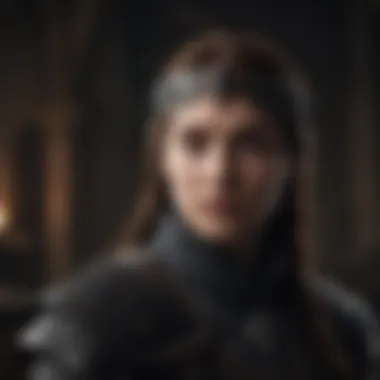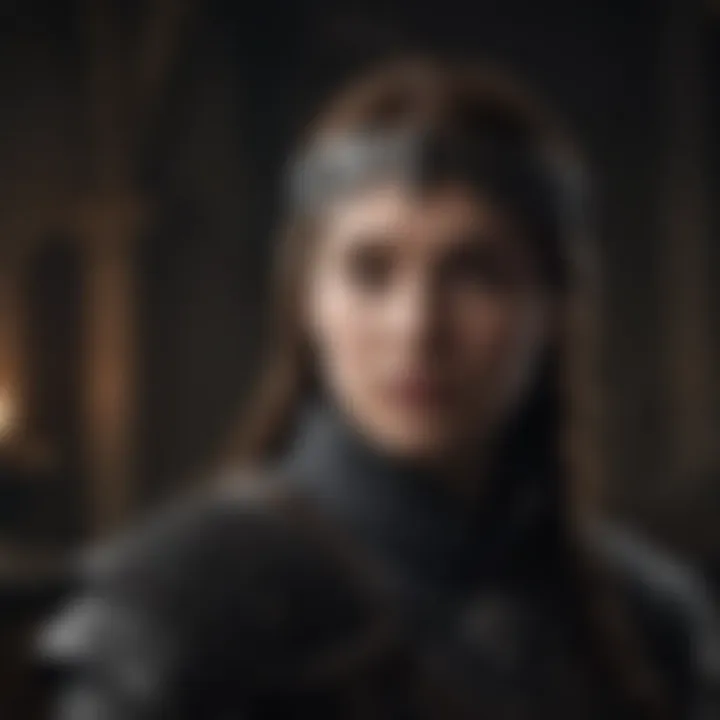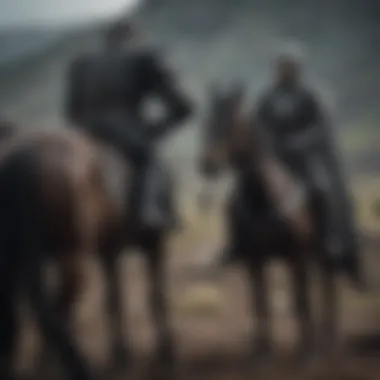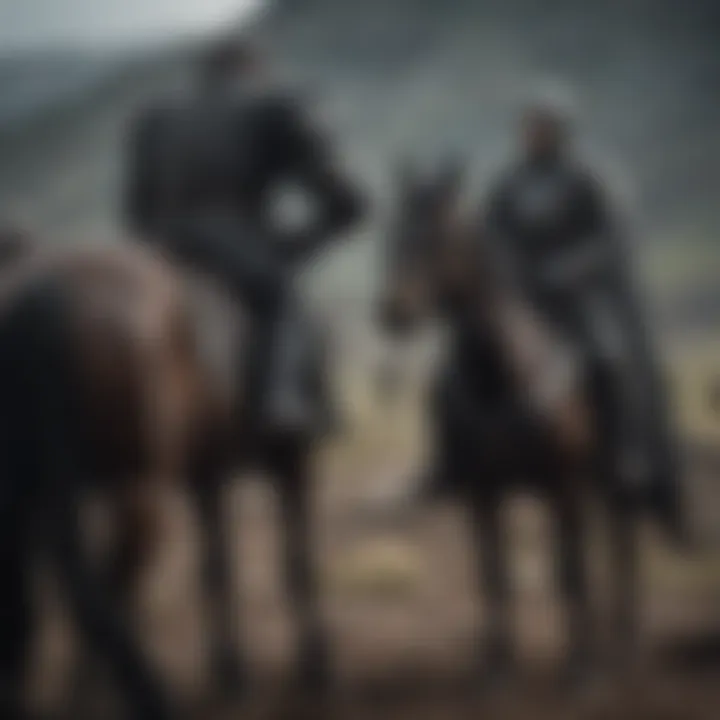The Dark Horse: Analyzing Unconventional Players in Game of Thrones


Intro
In the sprawling world of Westeros, where power is both coveted and treacherous, some characters stand out not by virtue of their high birth or warrior skills, but through sheer unpredictability and nuance—these are the dark horses. They often emerge from the shadows, influencing the tides of war and shifting the balance of power in ways that are both surprising and significant. This section aims to unravel the intricate threads of these unconventional players, illuminating how they interact with the grand machinations of the series while highlighting their transformative impact on the narrative.
Character Dissections
The conundrum of dark horse characters isn't just about surprising entrances; it’s very much about character development. While some characters start off perceived as minor players, their arcs reveal depths that deeply intertwine with the story's greater themes.
Key Characters in Game of Thrones
Some of the most compelling dark horse characters include:
- Petyr Baelish (Littlefinger): A master manipulator who thrives on chaos, his rise from humble beginnings to influence over the most powerful families in Westeros showcases a remarkable evolution. His longing for control and love drives him to pursue unattainable goals, displaying a blend of ambition and tragedy.
- Sandor Clegane (The Hound): Initially recognized for his brutish demeanor and intimidating presence, The Hound reveals unexpected layers of complexity as the show progresses. His disdain for authority contrasts with moments of unexpected empathy, showcasing the duality of his nature.
- Asha Greyjoy (Yara Greyjoy): The bold and fiercely independent daughter of Balon Greyjoy defies traditional gender roles within the Iron Islands. Asha's arc reflects not just personal ambition, but also larger themes of loyalty and defiance against patriarchal constraints.
This careful analysis of dark horse characters, their growth throughout the series, and their impacts on the overarching storyline provides a view into how they shape the fabric of Game of Thrones.
Episode Breakdowns
Each episode in Game of Thrones presents critical moments that underscore the significance of dark horses. We can break down key episodes that spotlight these characters:
- Season 1, Episode 7 - "You Win or You Die": Here, Littlefinger's machinations begin to take shape, illustrating his role as a power broker in the realm of chaos.
- Season 4, Episode 5 - "First of His Name": Not only is this episode crucial for the Stark family's storyline, but The Hound's unexpected alliance with Arya Stark begins to redefine his character’s position within the plot.
Key moments like these forge connections between the characters and the viewers, making us rethink our perceptions of what it means to be a pivotal player in a fractured realm.
Lore Explorations
Understanding the history and lore of Westeros is essential to grasp the motivations of dark horse characters. The deep-rooted traditions and histories provide context for their actions and propel their narrative significance. Here, we can dive into:
- The Targaryens and their fall: The effects of their downfall ripple through Westeros, setting the stage for various characters, including Littlefinger and The Hound, in their quests for power.
- The Iron Islands' culture: Asha's character gains richness when viewed through the lens of Ironborn traditions, illuminating her struggles against an unyielding legacy.
Fan Theories
Speculating about dark horse characters often invites fans to engage deeply with the narrative and consider how hidden details might reshape our understanding of future plot points.
Some prevailing fan theories include:
- Littlefinger's ultimate plan: Many fans ponder whether his true goal is to sit on the Iron Throne, or if it’s something more personal, stemming from his fixation with Catelyn Stark.
- The Hound's redemption arc: There’s ongoing debate about whether The Hound will ultimately choose to ally himself with the living or join the ranks of the undead.
As these theories swirl among fans, they open discussions that highlight the significance of seemingly peripheral characters, reinforcing their place in the larger narrative.
"In a game of thrones, one must continually adapt, bending with the winds of fortune to emerge stronger than before."
With each analysis and breakdown, the importance of dark horse characters becomes glaringly apparent. They teach us that in Game of Thrones, every player, no matter how unexpected, has the potential to turn the tide.
Defining the Dark Horse Concept
When diving into the rich tapestry of Game of Thrones, understanding the essence of the term "dark horse" is crucial. Not merely a label, this concept serves as a lens through which to analyze characters who defy expectations, often rising from obscurity to reshape the narrative landscape. They tend to be underestimated at the outset, yet their actions resonate deeply within the unfolding drama. Recognizing these characters enriches the viewer's experience, offering insights into themes of loyalty, struggle, and identity.
Origins of the Term 'Dark Horse'
The phrase "dark horse" originally appeared in horse racing. It referred to a horse that was unknown or hidden, surprising everyone by outperforming its competitors. Over time, this term seeped into common vernacular, symbolizing unexpected success. In literature and film, it embodies characters who may not fit the mold of traditional heroes yet have the potential to turn the tide. In the realm of Westeros, such individuals often navigate shifting allegiances and precarious power dynamics, much like those elusive horses that surprise the betting crowds.
Application in Literature and Film
In literary contexts, the dark horse manifests in various forms, highlighting the unpredictability of character arcs. In Game of Thrones, several characters epitomize this archetype, from Tyrion Lannister's cunning to Sandor Clegane's complex morality. Their journeys frequently challenge societal norms and expectations, making them stand out in a world brimming with traditional tropes.
- Examples in Other Works: The concept extends beyond Game of Thrones. Characters like Katniss Everdeen from The Hunger Games and Frodo Baggins from The Lord of the Rings also illustrate dark horse traits. They begin as unlikely contenders but, as the story unfolds, they prove pivotal in the struggle for power or survival.
- Themes: Dark horse characters often explore themes of resilience and transformation. Their stories reflect the chaos of their environments, as well as their capacity for growth, sparking both intrigue and empathy in the audience.
"In a world like Westeros, the unexpected often wields the greatest power."
Understanding the dark horse concept amplifies the appreciation of character depth in Game of Thrones. These non-traditional players aren’t merely side characters; they serve as catalysts shaping the fate of entire houses, kingdoms, and the overarching story itself.


Game of Thrones: A Complex Landscape
In the vast universe of Game of Thrones, understanding the complex landscape of political maneuvering, social hierarchies, and power struggles is paramount. This intricate web not only dictates the fates of the characters but also serves as the backdrop for dark horse figures to emerge.
The importance of examining this landscape lies in how it shapes narratives and influences character arcs, particularly those unexpected players who rise to prominence against all odds. A well-developed grasp of the power dynamics allows us to appreciate the strategic movements of dark horse characters, whose resilience often sets them apart in a world dominated by might and tradition.
Power Structures in Westeros
Westeros is a land steeped in deeply rooted power structures. The Seven Kingdoms are divided among noble families, each vying for supremacy over the Iron Throne. Houses such as Stark, Lannister, and Targaryen dominate the political theater, but within this hierarchy lurk those who appear peripheral yet possess the capability to turn the tide.
Key elements in this power structure include:
- Noble Houses: Each house brings its unique traits, ambitions, and legacies which influence Lordly behavior.
- Loyalty and Betrayal: Trust is a rare commodity in Westeros. Alliances shift like sand, rendering previously stable relationships fragile.
- Society's Expectations: Social norms dictate roles within the hierarchy, assigning power and status that often go unchallenged.
Through these layers, characters who defy expectations—woefully underestimated or overlooked—begin to carve their paths. The political machinations of Westeros often allow these dark horses to rise if they can navigate its intricate rules and social expectations.
Character Hierarchies and Expectations
Character hierarchies in Game of Thrones are as rigid as the stony landscapes of its settings. Each character often starts with not just a set of goals but also a predetermined societal role. The expectations set by lineage, gender, and reputation cast long shadows over their potential. For instance, a Lannister's gold is met with assumptions of cruelty, while a Stark’s honor might engender predictable outcomes in a ruthless game.
However, the narrative complexity is revealed when these characters challenge or evade the expectations foisted upon them. Some pivotal elements in this arena include:
- Predetermined Roles: Characters like Jaime Lannister embody the archetypal 'golden knight,' yet his arc displays how roles can mislead.
- Trope Subversion: Unconventional characters like Asha Greyjoy defy their expected destinies, illustrating the power of personal agency.
- Growth Through Crisis: Many dark horse characters evolve dramatically, shedding the limitations of their assigned roles.
This unpredictability in character hierarchies enriches the story, highlighting that underdogs can emerge victorious, shifting not just their fates but sometimes the very balance of power itself.
“The most intriguing characters are often those that don't fit inside the boxes we create for them.”
In summary, examining the complex landscape of Game of Thrones reveals the intricacies of both the social order and the unique characters that challenge it. The dark horses in Westeros are not merely players; they are key forces that shift the tides of conflict and ambition, re-defining what it means to wield power.
Notable Dark Horse Characters
The realm of Westeros is teeming with individuals who subvert expectations, navigating the treacherous political landscape with ingenuity and tenacity. Among these figures, the so-called dark horses emerge as pivotal players in shaping the narrative. These characters, often underestimated due to their background, appearance, or perceived shortcomings, consistently prove that strength may not always be found in nobility or brute force. Instead, they illuminate the rugged road of resilience and cleverly maneuver through the twists and turns of power struggles.
Tyrion Lannister: The Unlikely Strategist
Tyrion Lannister stands as a quintessential example of a dark horse in Game of Thrones. Despite being the "imp" of House Lannister, often marginalized by his family and society, Tyrion's sharp wit and strategic mind set him apart as a formidable player in the game of thrones. His intellect becomes his weapon, allowing him to outmaneuver opponents who rely solely on physical strength or political clout.
Tyrion's journey illustrates the complexities that an underestimated character can bring. Viewers watch him grow from a man who is ridiculed to one who commands influence through cunning negotiation and manipulation. His significant contributions in critical moments—such as his defense of King's Landing during the battle against Stannis Baratheon—showcase his ability to turn the tides in favor of his allies.
The significance of Tyrion's character lies in the representation of those who are often overlooked yet possess an inner strength. He embodies the notion that true power can come from intellect and compassion, enabling him to form unexpected alliances, like his bond with Daenerys Targaryen later in the series.
Sandor Clegane: The Hound's Redemption Arc
Sandor Clegane, famously known as The Hound, presents a fascinating character arc marked by violence and inner turmoil. Initially depicted as a brutal enforcer for the Lannisters, Sandor's story unfolds to reveal layers of complexity driven by trauma and an innate sense of justice. As a dark horse, Sandor's path reflects a redemptive journey, starkly contrasting with his earlier persona.
His brutal upbringing and scarred existence create a rich ground for character exploration. Despite his violent tendencies, viewers witness a gradual transformation as he confronts his own demons. The relationship he forms with Arya Stark showcases the struggle between his fearsome reputation and the flickers of humanity hiding beneath the surface.
He becomes a standout figure as he journeys toward self-acceptance and redemption, highlighting the theme that everyone, no matter their past, can find a glimmer of goodness within. In essence, Sandor Clegane's story serves to remind us that even those grappling with darkness can forge their own paths toward light.
Asha Greyjoy: Navigating a Patriarchal Society
Asha Greyjoy breaks the mold of traditional female characters in Game of Thrones. As the daughter of Balon Greyjoy, she exists in a society where women are often relegated to the sidelines. Defying the odds, Asha embraces her ambitions with formidable prowess, seeking command over her fate and the Iron Islands.
Her character exemplifies resilience in the face of patriarchal constraints. Asha's navigation through a male-dominated world is rife with challenges, yet her determination to claim her rightful place reflects the struggle for agency and autonomy. Unlike many of her contemporaries, she actively seeks leadership rather than passively accepting traditional roles.
Her ambition does not stem from sheer desire for power alone; it intertwines with her loyalty to her family and her fierce sense of identity. Asha serves as a powerful commentary on the complexities of gender and power, embodying the spirit of a dark horse as she disrupts conventional expectations. Through her journey, Asha challenges the societal norms placed upon women, earning her status as an instrumental character who reshapes the narrative surrounding female empowerment in a turbulent world.
"Dark horses do not seek validation; they forge their own paths, proving that success often lies in the most unexpected places."
In summary, these notable dark horse characters—Tyrion, Sandor, and Asha—each present unique angles that reflect broader themes in Game of Thrones. Their stories not only enrich the narrative but invite deeper reflection on the nature of power, identity, and resilience. Through their trials and triumphs, the series offers valuable lessons on the significance of those who dare to defy expectations.
Character Development and Growth


In the world of Westeros, where betrayal and ambition lurk in every shadow, the concept of character development emerges as a vital theme, particularly for those deemed as dark horses. These characters, often underestimated or overlooked, navigate a treacherous landscape filled with challenges that forge their identity and ambitions over time. Understanding their growth isn't just about following their journeys; it reveals the intricate tapestry of humanity interwoven through the series. The development of these unconventional players provides critical insights into their motivations and the broader implications within the story.
Journey of the Dark Horse
Every dark horse in Game of Thrones typically starts with a steep uphill climb. These characters often begin from positions of despair or obscurity, clawing their way into the light despite the odds stacked against them. Take Tyrion Lannister, for example, who begins the series labeled as a mere 'imp' by his family and the realm. Yet, his quest for respect and validation drives him to outsmart powerful foes, showcasing resilience and sharp wits that eventually earn him a significant place in the political arena of Westeros. Unlike traditional heroes, these journeys are paved with a mixture of small victories and gut-wrenching failures, making their paths profoundly relatable to viewers.
"The best revenge is to be unlike him who performed the injury." - Marcus Aurelius
This sentiment often resonates with dark horse characters, driving their development. Their growth can often be traced through milestones that are both triumphant and tragic, where every encounter helps shape their destiny. For instance, Sandor Clegane, known as The Hound, escapes the blood-soaked expectations of his family to carve a unique identity, struggling between his violent past and a desire for redemption. The exploration of their journey highlights how pivotal experiences affect and often redefine their choices continuously.
Key Challenges and Obstacles
Navigating the perilous waters of Westeros comes with its fair share of challenges for dark horse characters. They face obstacles that are not just external, but also internal, leading to profound moments of reflection and growth.
Some prominent challenges include:
- Social Stigmas: Many dark horses contend with societal expectations that constrain them. Asha Greyjoy, for instance, operates in a world dictated by male authority figures, which often forces her to assert her capability in unconventional ways, disappointing those who strictly adhere to the patriarchal norms.
- Moral Dilemmas: Characters like Tyrion often grapple with ethical decisions. The constant balancing between loyalty to family and a desire to do what *feels* right serves as a harsh reminder of their complexities.
- Betrayal and Trust Issues: Trust does not come easy for dark horse figures. After numerous betrayals, their relationships become strained, leading to self-doubt and uncertainty about allies. Sandor Clegane often stands alone, struggling to reconcile his past trauma with the need for companionship.
These challenges sculpt each character into a unique entity, constantly evolving with each twist and turn in the plot. They illustrate the perpetual struggle between desire and moral clarity, making their evolution both compelling and relatable.
Ultimately, the exploration of character development for these dark horses is essential. It unveils the nuanced narrative layers that enrich Game of Thrones, allowing audiences to connect deeply with characters who defy expectations. Each arc propels not just the individuals themselves forward, but also the broader themes of power, betrayal, and redemption that resonate throughout the entire series.
Thematic Elements Associated with Dark Horses
Exploring the thematic elements associated with dark horse characters in Game of Thrones is akin to unearthing hidden gems in a vast field. These players are often underestimated, and their journeys reveal profound issues about identity, loyalty, and the moral grayness of life within Westeros. The significance of these themes lies not just in their impact on individual characters but also in how they resonate across the rich narrative landscape.
One key theme is the transformation of identity. As these characters navigate the treacherous waters of political intrigue and personal struggle, their identities often shift dramatically. They emerge from the shadows, evolving into figures of resilience and strength. This journey speaks to the adaptability of the human spirit and the capacity for change, allowing audiences to witness the profound effect of circumstances on character formation.
Another essential thematic element revolves around the notions of loyalty and betrayal. In a world where allegiances shift as easily as the winds on the Wall, dark horses frequently redefine these constructs. Their choices—driven by personal convictions rather than societal expectations—illustrate the complexities of trust. Characters like Tyrion and Sandor Clegane illuminate how loyalty can be both a burden and a source of strength, often complicating relationships in unexpected ways.
"In Game of Thrones, every character has the potential to surprise, embodying what it means to be a dark horse—drifting in and out of perceived power, guided by motives that resonate with authenticity, even when society labels them as outcasts."
By understanding these thematic elements, viewers can appreciate how dark horse characters drive the narrative's emotional core. They often mirror the inner conflicts of the audience, drawing them deeper into the story. The interplay of identity transformation alongside the redefinition of loyalty keeps us engaged, prompting reflection on our moral choices and the unpredictable nature of allegiances.
The Transformation of Identity
The transformation of identity in Game of Thrones serves as a pivotal narrative device that makes dark horse characters compelling. Take Asha Greyjoy, for instance. She starts as a female figure bound by societal constraints, seemingly overshadowed by the overwhelming patriarchal influence of the Greyjoy family. Yet, as the story unfolds, Asha's metamorphosis is remarkable. She learns to claim her will, stepping away from the shadows, asserting herself not just as a Greyjoy but as an entity of her own. Through her eyes, viewers witness that identity is not static; it is shaped by choices and experiences that challenge perceived roles and expectations.
In a direction that is often pathos-driven, these transformations highlight themes of redemption and self-acceptance. Characters like The Hound, hailing from a background of violence and shame, discover their potential for change in the most unlikely of circumstances. As they navigate their inner demons, audiences begin relating to their struggles, realizing that transformation is a universal experience, even in a realm as fantastical and brutal as Westeros.
Redefining Loyalty and Betrayal
The redefinition of loyalty and betrayal is another critical thematic element entwined with dark horse characters. On the surface, the world of Game of Thrones is rife with treachery, yet the choices of dark horse characters reveal deeper truths about loyalty. Unlike traditional heroes, figures like Tyrion Lannister often place personal ethics above blind loyalty to their families. Through his manipulations and cunning strategies, he reframes the very meanings of these themes, inviting viewers to reevaluate what loyalty means in a context rife with betrayal.
Characters frequently find themselves at a crossroads, weighing the cost of allegiance against the allure of personal integrity. This notion resonates profoundly with the audience, pushing them to question the fabric of their own loyalties. The nuances of these relationships bring richness to the narrative, creating a counterpoint to the prevailing ideals of honor presented throughout the series.
In summary, the thematic elements associated with dark horses illuminate the complex fabric of Game of Thrones. The exploration of identity transformation, alongside the reevaluation of loyalty and betrayal, not only enriches character arcs but also engages viewers on a deeper, more thoughtful level. Through these unexpected characters, the narrative invites us to contemplate our beliefs within a world where the lines between right and wrong are often blurred.
Viewer Perception and Reactions
Understanding the viewer's perspective in relation to dark horse characters within Game of Thrones is crucial for several reasons. These unconventional players often challenge traditional narrative structures and expectations, making their reception a focal point of the broader discussion on storytelling. The responses of audiences not only reflect their individual interpretations but also illuminate the intricate relationship between character development and viewer engagement, allowing for a richer understanding of the show's impact in popular culture.
Engagement with Dark Horse Characters
When fans tune in to watch Game of Thrones, the subtleties of dark horse characters like Tyrion Lannister or Sandor Clegane become a significant part of the viewing experience. These characters often stand apart from the main power players, capturing attention in unexpected ways. For instance, Tyrion, often underestimated due to his stature, consistently surprises viewers with his keen strategy and intelligence. His wit resonates with audiences, leading to a deeper emotional investment that goes beyond mere plot progression.
This engagement stems from a sense of relatability. Viewers can see themselves reflected in these characters who operate on the fringes of power. They represent themes of resilience and unexpected capability, bridging the gap between fantasy and the everyday struggles of life.
Highlighting this connection generates fertile ground for discussions among fans. Social media platforms, like Reddit and Facebook, become arenas where fans analyze episodes and explore the motivations and arcs of these characters, creating a communal sense of belonging among viewers.
Fan Theories Surrounding Underdogs
The underdog trope in storytelling resonates deeply with audiences; this is no different with dark horses in Game of Thrones. The richness of these characters often sparks myriad fan theories that keep the community buzzing with speculation. Tony "The Hound" Clegane, for example, embodies many viewers' hopes for redemption and transformation, leading fans to theorize about his ultimate fate and potential alliances.


These theories are further supported by details presented throughout the series. Discussions about Clegane’s complex relationship with Arya Stark highlight the possibility of newfound loyalty, which can prompt predictions about future actions. Similarly, Asha Greyjoy's unexpected drive for power amidst patriarchal constraints leads fans to wonder about her potential rebellion against the norms that govern her environment.
"Dark horse characters in Game of Thrones challenge traditional hero narratives, allowing fans to engage in complex discussions that enrich their viewing experience."
Both the engagement and theories surrounding dark horse characters show how viewer perception plays a vital role in the storytelling of Game of Thrones. It enables audiences to explore these characters’ depths, empowering them to connect more profoundly with the series. By examining these unconventional players, viewers can appreciate the layers of narrative that often go unnoticed, enhancing the overall viewing experience.
Comparative Analysis with Other Narratives
In exploring the theme of dark horse characters within Game of Thrones, it is pivotal to broaden the lens to consider how similar themes play out across other narratives. The examination of comparative narratives deepens our understanding of the archetype and reveals layers of complexity that might otherwise go unnoticed. In literature and film, dark horses operate as catalysts, shifting narratives in unexpected directions. This exploration highlights not just individual characters but also the broader storytelling traditions that embrace the subversion of expectations.
Dark Horses in Other Fantasy Series
Many fantasy series spotlight dark horse characters, each illuminating different facets of the term. For instance, in Harry Potter, the character of Neville Longbottom evolves from a timid, unassuming student to a key player in the climactic battle against Voldemort. His journey showcases resilience and growth, reminding us that potential often thrives unnoticed until it manifests in moments of necessity.
In The Wheel of Time, characters such as Mat Cauthon illustrate the unpredictable nature of fate and chance. Mat begins as a carefree rogue, yet as the saga unfolds, his strategic mind emerges, impacting the world around him.
Additionally, take The Name of the Wind where Kvothe, a seemingly resourceful yet disadvantaged protagonist, captures the essence of a dark horse. His struggles and triumphs against the tide of a society that often underestimates him render the narrative compelling.
- Key Elements:
- Resilience and growth
- Subversion of expectations
- Character arcs that exemplify hidden potential
Influence on Character Archetypes
The exploration of dark horse characters has a profound impact on character archetypes in storytelling. Dark horses often serve to challenge traditional roles and expectations. They represent the everyman or everywoman, embodying qualities that resonate with audiences, such as vulnerability, strength, and unpredictability. These characters can also shift from individualistic journeys to influence larger political or moral themes in their respective narratives.
Consider the archetype of the underdog in popular culture. This figure often embodies the struggle against overwhelming odds, prompting audiences to root for them. Not only do they provide dramatic tension, but they also elicit empathy, making their victories feel earned and significant.
- Influences on Character Archetypes:
- Challenge traditional archetypes: Instead of the typical hero, disrupt the norm with flawed characters that resonate deeply.
- Elevate themes of perseverance and growth, thereby making stories richer and providing relatable content for viewers.
- Redefine the nature of loyalty, often creating complex allegiances that enrich narrative depth.
"The beauty of a dark horse is not just in their victory but in how that victory reshapes our understanding of strength and humility."
In sum, the comparative analysis of dark horse characters across various narratives adds significant value to the understanding of their role in storytelling. Beneath the surface, these characters reflect societal themes, evoke deeper emotional responses, and challenge preconceived notions of power and worth. As such, studying them unlocks a broader comprehension of what makes a narrative not only compelling but timeless.
The Role of Dark Horses in Storytelling
In the realm of storytelling, dark horse characters serve as pivotal agents of change. They often rise from the shadows, challenging the status quo and reshaping the narrative landscape. Their very essence becomes a canvas on which themes of resilience, loyalty, and unexpected wisdom are painted. As we explore their significance within Game of Thrones, it becomes clear that they are not mere side attractions but integral components that drive the plot forward.
Driving Narrative Arcs
Dark horse characters introduce twists and turns that propel narratives into exciting and often unforeseen directions. Consider Tyrion Lannister, who, though born into a family of privilege, faces significant discrimination due to his stature as a dwarf. His underdog status prompts viewers to root for him throughout his journey—every scheme he concocts or battle he engages in resonates deeply as a testament to his wit and cunning over brute strength. This arc has implications not only for his personal growth but also for the larger political landscape in Westeros.
Each decision he makes ripple through the lives of other characters, reshaping alliances and creating new trajectories for the unfolding drama. The inner workings of characters like Tyrion create web-like connections that elevate the stakes, leaving audiences on the edge of their seats. Here, dark horses facilitate the emergence of complex story arcs that might otherwise remain stagnant.
Creating Tension and Conflict
The presence of dark horse characters invariably amplifies tension and conflict in a narrative. When characters defy expectations, they evoke a sense of mistrust and uncertainty among those around them. Take Sandor Clegane, known as The Hound; his evolution from a brutish killer to a character grappling with his own moral compass showcases tension in its truest form.
His contempt for the societal norms places him at odds with others, thereby creating conflict not just within himself, but with the world at large. Tension escalates as characters respond to his unpredictability, which drives the narrative deeper into chaos or revelation. This dynamic can lead to moments where loyalties are betrayed, alliances shift, and the characters—along with the viewers—question their understanding of justice and morality.
"Dark horses force us to confront our biases and question our allegiances, enriching the story with layers of complexity that resonate beyond the screen."
The intricate dance of dark horse characters alongside established figures generates conflict, perfect for revealing deeper truths about both character and plot. As we witness the rivalries and alliances transform, it reinforces the idea that nothing is set in stone, keeping the audience guessing and continually engaged.
Culmination: The Value of the Unexpected
Dark horse characters in Game of Thrones teach us that the most unassuming figures can carry immense significance within a narrative. Their unexpected journeys and roles underline the idea that not everything is as it seems in the game of power. The surprise factor they bring often ignites deeper engagement, prompting viewers to rethink their interpretations of strength and resilience.
Lessons Learned from Dark Horse Characters
There are several key takeaways from the characters who step out of the shadows in Westeros.
- Resilience Over Might: Characters like Tyrion Lannister epitomize how intelligence and perseverance can triumph over brute strength. His clever strategies have often turned the tides, demonstrating that being underestimated can be an advantage.
- Complex Morality: The moral ambiguity of figures like Sandor Clegane, or The Hound, shows that heroes and villains aren’t always dichotomous. They teach us that actions often carry complex motivations and justifications, making us question our own biases.
- Cultural Commentary: Characters such as Asha Greyjoy illuminate the challenges of navigating patriarchal structures. Their existence prompts discussions around gender roles and societal expectations in both the fantasy world and our own.
The Enduring Appeal of Complex Narratives
Stories featuring dark horse characters resonate deeply with audiences due to their layered complexity. Here are some reasons why these narratives stand out:
- Relatability: Viewers often find themselves rooting for underdogs because they mirror real-life experiences of struggle and triumph, making the storylines more engaging.
- Surprise Elements: The unpredictability of how dark horses will affect the plot keeps the audience on their toes. This intrigue enhances the viewing experience as fans craft theories and discuss potential outcomes.
- Emotional Investment: The journeys of these characters usually evoke strong emotional responses. When viewers invest in characters’ growth, the narrative becomes a shared journey of evolution and discovery.
Compelling stories reveal that even the most overlooked individuals can shape history, embodying the notion that every player in Game of Thrones has the potential to make a significant impact. In a universe filled with treachery and ambition, the dark horses often carve pathways that surprise and challenge conventional wisdom, showing the true essence of humanity in the game.



